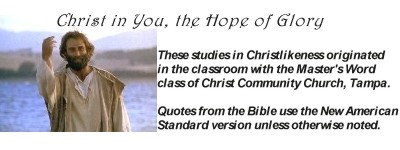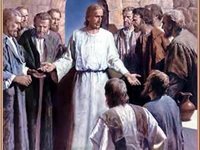 “The Lord is not slow about His promise, as some count slowness, but is patent toward you, not wishing for any to perish but for all to come to repentance.” -2 Peter 3:9
“The Lord is not slow about His promise, as some count slowness, but is patent toward you, not wishing for any to perish but for all to come to repentance.” -2 Peter 3:9 Opening Thoughts
Opening ThoughtsSo, how lost IS lost?
Driving down the lonely highway, out in the middle of the desert. You haven’t seen a crossroads in more than 100 miles, much less a gas station. Your cell phone is dead and the map flew out the window hours ago. Now you come to a fork in the road and you have no clue which way to go.
Are you lost – oh yeah. Would you be willing to stop and ask for help if you could find it, even if you’re a guy? Definitely. What does it mean to be lost? Life is not over, you look for a solution, you hope to get back on track. But one thing for sure: for things to get resolved, you need to know how lost you are!
The Pharisees didn’t know how lost they were. And they didn’t care about those around them who were truly lost. The parables in Luke 15 help us to get the Savior’s perspective of understanding our lost condition, and what to do about it.
Study Notes
Lost and Found

1. How lost is lost?
- Can you be just a little lost? – Romans 1 and 3 make it clear that each of us are desperately lost in our sin, wandering in darkness, never able to enjoy God's holy presence
- 3 ways to get lost
> aimless wandering - leads to danger -- Lot
> carelessness – leads to uselessness -- Samson
> rebellion – leads to misery
2. Luke 15 – The Lost & Found Department
- The crowds are coming -- tax gatherers, sinners, a tough crowd!
-- What was wrong with being a tax collector? Usually a Jew working for Gentiles, a bad thing; worse: collecting taxes for Roman govt, essentially “sold out” to Rome
-- God doesn’t like sinners? He receives them, eats with them, reaches out to them - How Jesus used parables -- when studying the parables, you want to look for why He chose to teach, and why this particular story
-- here: His character
-- often to answer a question or deal with an attitude
-- often a “surprise” ending
-- here: why He eats with sinners
-- dismisses self-righteous attitude - what is the purpose of each of these three parables?
- The lost sheep
-- always ready to leave the bunch to go after the one
-- rejoice with me! He feels deeply and personally when a soul is rescued
-- there will be more joy in heaven - imagine! - The lost coin
 -- this woman was desperate; she lit a lamp, swept the house, searched every corner of the dark, dirt floor carefully
-- this woman was desperate; she lit a lamp, swept the house, searched every corner of the dark, dirt floor carefully
-- there is joy over one sinner who repents
-- the angels' joy – see 1 Peter 1:12; 1 Corinthians 11:10
-- the Greek drachma coin was commonly equivalent to a day’s wage; one custom of the time was a headdress of 10 coins woven together and worn by Jewish women as symbol of marriage
-- the lamp needed because there probably were no windows and the floor was normally packed dirt - the first two of these parables set the stage for the third
-- they speak to Pharisees' concern for possessions and position
-- they emphasize concern for something lost and the genuine joy of finding what was lost
-- the third parable transfers or transforms the human story to God and His concern for the lost sinner - The lost son
-- Independence--
How are we being independent?
> Our priorities are wrong
> We cling to the familiar, or immediate, or pleasurable
Why am I being independent?
> Doubt the goodness of God
> Don’t understand God’s perspective - "Dad, I wish you were dead!"
-- that's really what he was saying; he was asking for an inheritance that isn't his until his father is dead
-- these acts should have completely ostracized the son, and probably embarrassed the father in the community
-- but! The Father let him go
> he insists on love relationship, not obligation
> he knew his son would fail
> so he anxiously awaits the son's return
> then he runs to greet him when he does return – that day's culture considered it undignified for an older man to run, he would lose face; he probably hadn’t run for 20 years, and he would have to gather up his robe, showing his boney legs - but he ran! - What we learn from this parable
> Jesus chose to lose face for us
> Note the tremendous contrast between our rebellion and God’s forgiveness
> The turning point is verse 17, he came to his senses! – do we see repentance at this point? maybe not completely; this could just be“plan B” (D.Jeremiah); he wasn’t ready for grace yet, he’s still attempting to save himself
> verse 20, he got up, picked himself up and got himself going
> but when he fell into his father’s arms, he realized that his father had never stopped loving him, he was overcome by grace - The Rebellious Son In The Key Of F (from Hampton Keathley on bible.org)
Feeling footloose and frisky, a foolish fellow forced his father to fork over his fourth of the family farthings and flew far to a foreign field where he fast frittered his fathers fortune feasting foolishly with faithless friends. Fleeced by his fellows and folly, and facing famine he found himself a feed flinger in a filthy farm. Flushed and fairly famished he fain would have filled his frame with foraged food from farm fodder.
“My father’s flunkies fair far finer.” The frazzled fugitive forlornly fumbled. Frustrated and filled with forboding, he fled forthwith to his father. Falling to his father’s feet he forlornly fumbled, “Father, I have flunked and frugalessly forfeited family favor.” The fugitive’s, faultfinding brother frowned on fickle forgiveness, but the faithful father figure filled with fidelity, cried, “The fugitive is found. What forbids further festivities. Let the flags unfurl and the fanfares flare.” Father flagged a flunky who fetched a fatling from the flock and fixed a feast.
The moral of the story is: The father’s forgiveness formed a foundation for the fugitive’s future fortitude.
For further study:
1. Meditate on the Fruit of the Spirit in Gal. 5:22-23, thinking about how Christ reflected each of the fruit in His life.
2. Read Matthew 22-24, known as the Olivet Discourse. These important words from the Savior come just before the last week and the Crucifixion. Try to get some of the main points He seeks to bring across.
3. As we’ve been looking at the life of Christ, what ways have you noticed as He ministers to and teaches His disciples? Are those things happening in your life, as one of His disciples?








